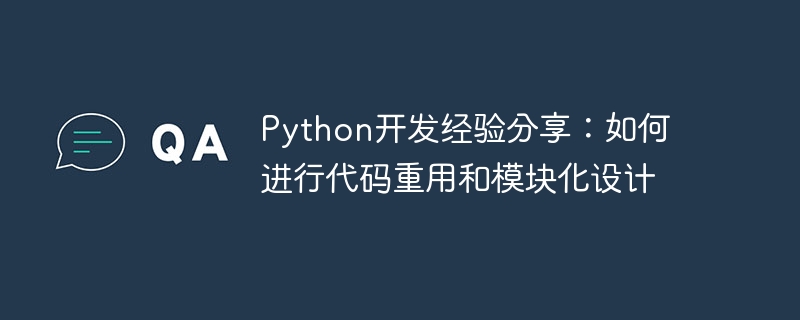Home >Backend Development >Python Tutorial >Python development experience sharing: how to carry out code reuse and modular design
Python development experience sharing: how to carry out code reuse and modular design
- WBOYWBOYWBOYWBOYWBOYWBOYWBOYWBOYWBOYWBOYWBOYWBOYWBOriginal
- 2023-11-22 08:13:151253browse

Python development experience sharing: how to carry out code reuse and modular design
Introduction:
In software development, code reuse and modularization Design is very important. They can improve code maintainability, readability, and testability, thereby improving development efficiency. As a high-level programming language, Python has powerful code reuse and modular design capabilities. This article will share some experiences in implementing code reuse and modular design in Python development.
1. Using functions and classes
Functions and classes are the most commonly used tools to achieve code reuse and modular design in Python. By encapsulating repeated code into functions, you can avoid code redundancy and improve code reusability. Classes are more powerful and can encapsulate data and behavior to achieve a higher level of modular design.
When using functions and classes, you need to pay attention to the following points:
- The naming of functions and classes must be meaningful and be able to clearly express their functions and effects;
- The interfaces of functions and classes should be designed to be concise and clear, following the "single responsibility principle";
- Try to avoid using global variables inside functions and classes, and instead implement data transfer through parameter passing and return values. ;
- When using functions and classes, exception handling and error handling should be considered to ensure the robustness of the code.
2. Using modules and packages
A module in Python is a collection of related Python codes. You can use the functions, classes and variables defined in the module by importing it. Modules can split code into different files to improve code readability and maintainability. At the same time, Python also supports the organization and packaging of modules to form larger functional units, namely packages.
When using modules and packages, you need to pay attention to the following points:
- The naming of the module must be meaningful and be able to clearly express its functions;
- Use modules appropriately Level variables can easily share data between different functions and classes;
- For frequently used functions and classes, you can import them into the namespace of the current module for direct use;
- Using packages to organize and manage code can improve the maintainability and scalability of the code.
3. Use third-party libraries and frameworks
Python has a wealth of third-party libraries and frameworks that can meet the development needs of various fields. Using third-party libraries and frameworks can greatly reduce development workload and improve development efficiency. At the same time, third-party libraries and frameworks have also undergone extensive practice and verification, and can provide more stable and efficient function implementation.
When using third-party libraries and frameworks, you need to pay attention to the following points:
- Determine the reliability and stability of third-party libraries and frameworks, and choose ones that are widely used and maintained Open source projects;
- Read the documentation of third-party libraries and frameworks to understand their usage and precautions;
- Learn to use packaging tools to integrate third-party libraries and frameworks into projects;
- When you encounter a problem, you can solve it by checking the official documentation and searching the relevant community forums.
Conclusion:
Code reuse and modular design are very important for Python development. By using functions and classes, modules and packages, as well as third-party libraries and frameworks, the code can be made clearer, concise and maintainable, thereby improving development efficiency. I hope that the sharing of this article can be helpful to Python developers in terms of code reuse and modular design.
The above is the detailed content of Python development experience sharing: how to carry out code reuse and modular design. For more information, please follow other related articles on the PHP Chinese website!

